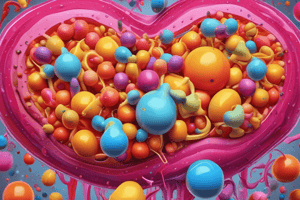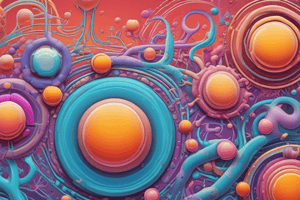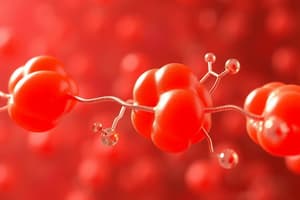Podcast
Questions and Answers
What happens to the lipids if not used by the body?
What happens to the lipids if not used by the body?
They are stored in the body in different compartments.
What are lipoproteins?
What are lipoproteins?
Lipoproteins are complexes that aggregate lipids for transport in the blood.
What happens to lipids once inside the cell?
What happens to lipids once inside the cell?
Fatty acids and glycerol are reassembled into triglycerides.
Cholesterol is used in the synthesis of bile acids.
Cholesterol is used in the synthesis of bile acids.
What is lipogenesis?
What is lipogenesis?
What is lecithin?
What is lecithin?
What is hypolipidemia?
What is hypolipidemia?
Total cholesterol (TC) is considered low if it is less than ____ mg/dL.
Total cholesterol (TC) is considered low if it is less than ____ mg/dL.
Low-density lipoprotein cholesterol (LDL-C) is considered low if it is less than ____ mg/dL.
Low-density lipoprotein cholesterol (LDL-C) is considered low if it is less than ____ mg/dL.
Flashcards are hidden until you start studying
Study Notes
Lipid Storage
- Fat is stored in two main compartments: subcutaneous (under the skin) and visceral or abdominal (around the internal organs).
- Lipids are aggregated into lipoproteins through the action of a microsomal triglyceride transfer protein (MTP)
Lipoproteins
- Lipoproteins are particles transporting lipids in the blood.
- They are made up of a core of lipids surrounded by a shell of proteins, phospholipids, and cholesterol.
- Different types of lipoproteins exist, including chylomicrons, VLDL, LDL, and HDL.
Lipid Metabolism
- Once inside the adipose cells, fatty acids and glycerol are reassembled into triglycerides and stored for later use.
- Muscle cells may also take up fatty acids and use them for muscular work and generating energy.
- Triglycerides are hydrolyzed back into fatty acids in the adipose tissue.
- Fatty acids are transported into adipose cells, where they are resynthesized into triglycerides and stored as droplets.
Cholesterol
- Some cholesterol is required for the synthesis of bile acids.
- Cholesterol keeps the cell membrane fluid.
- HMG Co-A reductase is a key regulatory enzyme in cholesterol synthesis.
Metabolism
- The liver converts glucose via Acetyl CoA into fatty acids.
- This process is called lipogenesis and creates lipids (fat) from acetyl CoA. It takes place in the cytoplasm of adipocytes (fat cells) and hepatocytes (liver cells).
Hypolipidemia
- Hypolipidemia is a decrease in plasma lipoproteins caused by primary (genetic) or secondary factors.
- It is usually asymptomatic and diagnosed incidentally on routine lipid screening.
- Total cholesterol (TC) < 120 mg/dL (< 3.1 mmol/L) or low-density lipoprotein cholesterol (LDL-C) < 50 mg/dL (< 1.3 mmol/L) are considered low levels.
Studying That Suits You
Use AI to generate personalized quizzes and flashcards to suit your learning preferences.




